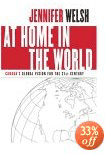Politics/Economics:
At Home in the World: Canada's Global Vision for the 21st Century

by Jennifer Welsh
266 pages,
ISBN: 0002006650
Post Your Opinion | | Brief Reviews
by Martin Loney
It has become commonplace to note that Canada's role in the world is much diminished. The Canadian economy is heavily dependent on trade with the U.S., which accounts for more than 80 per cent of Canada's exports, close to a third of Canada's Gross Domestic Product. Yet our relations with our major trading partner are a continual source of national angst, from the Council of Canadians and its many allies in the chattering classes, fearful that we are too far under the U.S. thumb, to neo-cons, anxious that we dance more prettily to Washington's tune.
Jennifer Welsh, a Canadian-born lecturer in international relations at the University of Oxford, offers a different vision. Hers is of a Canada that seeks to be a confident, "model citizen" in the world, sharing our values in the name of global development. Canada should promote democracy, human rights, and the rule of law. Welsh eschews what she sees as the impossible task of becoming America's best friend, less from a reluctance to move too close to the U.S. than a realisation that it is simply a flawed vision. The U.S. does not see Canada as an important player on the world stage, though it does have common security interests. Other powers are much larger in America's international calculations.
The U.S. may be interested in increasing continental economic integration, but, Welsh argues, there is simply no desire to pursue the political integration that lies at the heart of the European Union project. Welsh succinctly notes: "When placed alongside the European Union's Rome Treaty, the preamble to NAFTA looks like a contract between a new homeowner and his mortgage lender." No single power dominates the European Union but any similar venture in the Americas would immediately run up against the extraordinary weight of the world's only superpower. Welsh rejects the argument that we need some "grand bargain" with the U.S. that could involve measures respecting security and a continental energy plan. She favours, instead, continuing efforts to strengthen Canadian relations with key individuals and institutions that might serve to advance Canada's trade agenda.
The continuing U.S. use of tariffs and other trade restrictions in softwood lumber, steel and agriculture is a major irritant. Welsh suggests that no 'grand bargain' is likely to resolve these issues that are driven by U.S. protectionist interests. More aggressive use of the World Trade Organisation's dispute resolution mechanisms can provide some mitigation.
There is a certain breathless naivetT in Welsh's reading of Canadian politics, a willingness to confuse the apparently well-meaning statements of politicians with facts. Readers may be surprised to find that "with the arrival of a new prime minister, national priorities are starting to take shape. The top two are securing Canada's social foundations, particularly in the realm of health care, and reforming democratic decision-making." In reality, beyond throwing more money into the system, there is no sign that the government has any agenda to address the increasing disparity between health care inputs and health care quality. Patronage remains a driving principle in Martin's Ottawa, while tackling the democratic deficit remains a sound bite, not a reflection of any substantive change.
Welsh is equally credulous regarding Ottawa's response to 9/11, an issue that might have been expected to absorb a lot more of the author's critical intelligence than it does. Canada, Welsh urges, should "resist any suggestion that it has failed to take counterterrorism seriously," pointing to Canada's 1996 decision to place immigration control officers at airports to prevent travellers with false documents from entering Canada. In fact, Canada's borders remain extraordinarily porous. The dependence on locally recruited staff, the large role given to lawyers in the immigration and refugee determination process, and the pervasive failure to remove failed claimants and even those convicted of serious criminal offences ensure that Canada remains a hospitable destination for terrorists (and international criminals).
In contrast to Welsh's optimistic assurances, William Bauer, a former ambassador and member of the Immigration and Refugee Board, warned the Canadian Senate, five years after the introduction of the stepped up security measures: "You were told that when a person arrives in Canada there will be a security check up front. Sixty per cent of the people arriving on our doorstep claiming refugee status have either no documents or false documents. We do not know who they are. How can you do a security check on someone who is probably using a false name? You cannot." Welsh believes Canada's immigration and refugee determination system is a source of strength. Bauer, winner of the Raoul Wallenberg Humanitarian Award, has called Canada's refugee policies "a massive corruption of the noble concept of political asylum."
The optimistic assumptions Welsh makes about Canada, including that "national cohesion is reasonably robust", no doubt encourage her ambitious agenda for the world's "model citizen". This involves taking a leading role in reforming the UN, though in the wake of the organisation's failures in the Balkans, Rwanda, Sudan and the ongoing evidence of systemic corruption in the oil-for-food program, there might seem to be more promising candidates. The reform challenge may be more marked if Welsh's suggestion that membership in international bodies should be "conditional on conformity with basic human rights principles" is applied. This would certainly cut the UN down to a more manageable size, but it contrasts with Welsh's earlier proposal that the permanent members of the Security Council should include representatives from the League of Arab States and the African Union. Neither organisation is likely to have many members if human rights principles are taken into account.
Welsh offers an idealistic vision of Canada both at home and in the world. In the current international climate we should be asking whether a more muscular response might not be required.
|